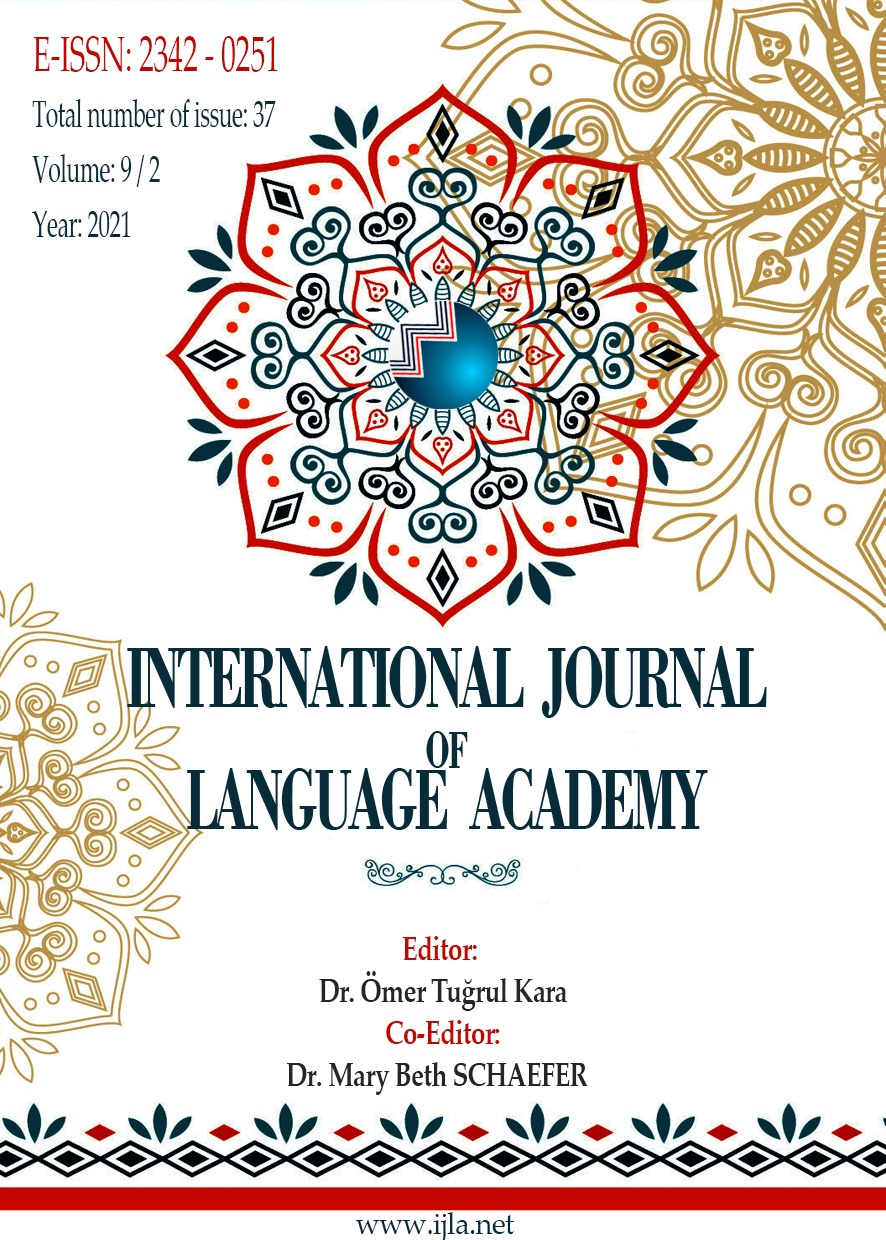Author :
Abstract
Türkiye Türkçesi öğretiminde hedef kitleye uygun bir yaklaşım seçmek önemlidir. Okuma, dinleme, konuşma ve yazma becerilerinin birlikte ilerlemesi öğrenme alanlarının gelişmesine olanak sağlar. Çünkü her beceri birbirini besler. Öğrenicileri isteklendirmek için ortak kelimeler, dil yapılarının benzerliği, ortak kültürel ögeler gibi etkenler dil öğrenim sürecini kolaylaştırır. Öğrenicilerin etkili bir iletişim kurabilmesi bakımından öğrenme-öğretme ortamının uygun olması, öğreticinin konuşma sürecini iyi yönetmesi, öğrenicinin materyaller yardımıyla desteklenmesi ve öğreniciye dönüt verilmesi bir hayli önem taşır. Yani öğrenicinin ilgi alanına göre dil öğrenme ortamının oluşturulması konuşma becerisini etkiler. Bu sebeple karşılıklı ve sözlü anlatım konuşma yeterliklerini geliştiren etkinliklerin oluşturulmasında, hayatın uygulama alanının öğrenme-öğretme ortamına yansıtılmasında büyük ölçüde fayda vardır. Bu çalışmada, Kırgızlara Türkiye Türkçesi öğretiminde, temel ve orta düzeyde öğrenicilerin konuşma becerilerini incelemek amaçlanmıştır. Bu bağlamda çalışmada nitel araştırma yöntemlerinden durum çalışması esas alınmış ve öğrenicilerin konuşma becerilerinin değerlendirilmesine ilişkin veriler gözlem yoluyla tespit edilmiştir. Çalışmada, kelimelerin doğru telaffuz edilmesi, ifade gücü, ses tonunun iyi ayarlanması, sesi doğru boğumlama vb. unsurlar öğreticinin öğrenme ortamındaki gözlemi yoluyla değerlendirilmiştir. Bu kapsamda öğrenicilerin süreç içerisindeki hatalı kullanımlarına örnekler verilmiştir. Çalışma sonucunda, konuşma becerisinin önündeki en temel engelin hedef kitlenin kendi dilinden olumsuz aktarım yaparak dili yanlış seslendirmesi olduğu ve temel düzeyden itibaren telaffuz eğitimine daha çok önem verilmesi gerektiği tespit edilmiştir.
Keywords
Abstract
It is important to choose an approach suitable for the target audience in teaching Turkish. The development of reading, listening, speaking and writing skills allows the development of learning areas. Every skill feeds each other. Factors such as common words, similarity of language structures, and common cultural elements facilitate the language learning process to motivate learners. In order for learners to be able to communicate effectively, it is very important that the learning-teaching environment is appropriate, that the teacher manages the speaking process well, that the learner is supported with the help of materials and that the learner is given feedback. The creation of a language learning environment according to the learner's interest affects the speaking skill. For this reason, it is highly beneficial to create activities that develop mutual and oral expression speaking competences, and to reflect the application area of life to the learning-teaching environment. In this study, it is aimed to examine the speaking skills of basic and intermediate level learners in teaching Turkish to Kyrgyz students. In this context, the study was based on case study, one of the qualitative research methods, and the data on the evaluation of the speaking skills of the learners were determined through observation. In the study, the correct pronunciation of the words, the good tuning of the tone, the correct articulation of the voice, etc. were evaluated through the teacher's observation in the learning environment. In this context, examples of the learners' misuse in the process are given. As a result of the study, it has been determined that the most basic obstacle in front of speaking skills is the target audience's incorrect pronunciation of the language by making a negative transfer from their own language, and that more importance should be given to teaching pronunciation from the basic level.
Keywords
- Boylu, E. ve Çangal, Ö. (2015). Yabancı dil olarak Türkçe öğrenen Bosna-Hersekli öğrencilerin konuşma kaygılarının çeşitli değişkenler açısından incelenmesi. Uluslararası Türkçe Edebiyat Kültür Eğitim Dergisi, 4 (1), 349-368.
- Fidan, D. (2017). Söz edimi kuramına genel bir bakış ve eğitim ortamlarında kullanımı: diksiyon dersleri için bir etkinlik denemesi. Turkish Studies, 12 (25), 373-400.
- Göçer, A. (2015). Türkçenin yabancı dil olarak öğretiminde konuşma becerisinin kazandırılması. Trakya Üniversitesi Sosyal Bilimler Dergisi, 17 (2), 21–36.
- Gümüş, M., Şen, İ., Saldıran, M., Çelik, G., Nergiz, R. ve İsen Özek, B. (2020). Altın Köprü Türkçe öğretimi ders kitabı A1. Bişkek: Kırgızistan-Türkiye Manas Üniversitesi Yayınları.
- Günaydın, Y. ve Arıcı A. F (2020). Türkçenin yabancı dil olarak öğretiminde etkileşimli okumanın konuşma becerisine etkisi. EKEV Akademi Dergisi, 24 (83), 673-696.
- Günaydın, Y. (2021). Türkçenin yabancı dil olarak öğretiminde konuşma kulüpleri. EKEV Akademi Dergisi, 25 (85), 531-544.
- Güneş, F. (2014). Konuşma öğretimi yaklaşım ve modelleri. Bartın Üniversitesi Eğitim Fakültesi Dergisi, 3 (1), 1-27.
- İlgün, K. (2015). Yabancı dil olarak Türkçenin öğretiminde telaffuz becerisini geliştirmeye yönelik tekerleme ve ninnilerin kullanımı (Yayımlanmamış Yüksek Lisans). Gazi Üniversitesi Eğitim Bilimleri Enstitüsü, Ankara.
- İşcan, A. ve Karagöz, B. (2016). Yabancı dil olarak Türkçe öğretiminde konuşma becerisi kazandırmada filmlerin kullanımı. Atatürk Üniversitesi Sosyal Bilimler Enstitüsü Dergisi, 20(4), 1265-1278.
- Şenyiğit, Y. ve Okur, A. (2019). Yabancılara Türkçe öğretiminde konuşma becerisi ve telaffuz eğitimi. Mehmet Akif Ersoy Üniversitesi Eğitim Fakültesi Dergisi, 52, 519549.
- Tüm, G. (2014). Çok uluslu sınıflarda yabancı dil Türkçe öğretiminde karşılaşılan sesletim sorunları. Hacettepe Üniversitesi Eğitim Fakültesi Dergisi, 29 (2), 255-266.
- Türk Dil Kurumu Sözlüğü, Gözlem. Erişim tarihi: 21.04.2021.
- Yıldırım, A. ve Şimşek, H. (2018). Sosyal bilimlerde nitel araştırma yöntemleri (11. Baskı). Ankara: Seçkin Yayıncılık.





